- Home
- Lindsay Buroker
Dragon Storm Page 2
Dragon Storm Read online
Page 2
Numerous bullets slammed into the deck, but many hit their marks. Pirates fell under his relentless fire.
A part of him worried that he could delight in slaying human beings, even if they were proven enemies of Iskandia, but a deeper, more primitive part of him claimed that this was how it was meant to be. He was like some great predator chasing down his prey, reveling in the hunt.
He willed the pirates’ bullets to zip past his flier instead of striking it—or him—though he knew that didn’t truly have an effect. His mad gyrations were what made it difficult for them. Even so, a few of their bullets gouged the lightweight material of his wings. Fortunately, the flier’s body was made of wood with a bronze veneer, and could take a few hits.
At least a dozen pirates lay on the deck, clutching their wounds, by the time Trip flew out on the far side. Rifle fire chased him, and he stayed low in the cockpit. He flew in a loop so he could come back around for another attack.
He longed to target the boiler he knew to be protected within the ship itself, but he would need explosives for that. His bullets wouldn’t tear through the wood hull. Instead, he dove in for another strafing run.
The deck was significantly clearer this time, many of the pirates having taken refuge below. He caught a few stubborn ones crouching behind the railing and shooting at him, and he targeted those. A bullet struck the corner of his windshield, and a spider web of cracks sprang across it. He fired relentlessly, knowing they would get him if he didn’t get them first.
He flew so close that he scared the two men into leaping over the railing and into the river below. Good. Two fewer pirates to deal with.
As he flew over the deck, his wings almost hitting the bottom of the envelope, he angled left to send as many bullets into the wheelhouse as possible. He might not be able to destroy the engine or the boiler from up here, but if he could damage the steering mechanism, that would be good enough.
More booms sounded, and Trip cursed. What pirates were able to throw explosives with him causing so much trouble for them?
He realized the noise had come from the town. Someone had gotten a cannon out and was lobbing balls at the dirigible.
Someone down there either had good aim or got lucky. One of those balls crashed through the rear hull of the ship and struck something important. Important and flammable.
As Trip ended his run and flew away from the ship, looping to engage in another one, an explosion erupted from within the craft. It blew a giant hole in the hull, and flames shot out of the side. He grinned viciously, wanting to hug whoever was manning that cannon down there.
In addition to damaging the hull, the flames from the explosion blew high enough to catch the envelope on fire. Trip spotted Leftie flying up there, cheerfully riddling it full of holes. He suspected it was the flames rather than the bullets that did the serious damage, but either way, the dirigible listed sideways and drooped toward the river.
“The reinforcements are here,” Leftie said.
Anchor and the rest of the squadron were flying up the gorge toward them, their paths surprisingly full of weaving and erratic flying. Trip spotted the reason why. The three pirates in the stolen fliers were behind them. Coming to help their comrades?
“Let’s get those three,” Trip said, arrowing toward the pursuers.
Perhaps seeing that the dirigible was out of commission and the town was safe for the moment, Anchor ordered everyone to join in. The entire squadron turned, catching the pirates by surprise—the pirates hadn’t yet been close enough to see their downed allies.
As far as Trip knew, neither the Cofah nor the pirates that plagued the coast had an equivalent to Iskandian communication crystals, so they couldn’t easily relay messages among their forces.
His squadron mates brought down two of the enemy fliers before Trip was close enough to help. Illogically, he felt a twinge of disappointment. He and Leftie had just taken down a dirigible, after all.
But the colonel hadn’t seen that. It was silly, but Trip wanted to be seen defeating the enemy. Flying was wonderful, and he felt at home in the sky, but he also longed to have people treat him like a hero rather than an oddity. One day, he hoped to have the kind of reputation that General Zirkander had, one of being a famous protector of the country, loved wherever he went.
As Trip darted toward the third pirate flier, he glimpsed Colonel Anchor angling in from the opposite direction. Their eyes met briefly, Anchor as dyspeptic as ever behind his goggles. Reluctantly, Trip admitted that hero status would have to wait. For now, he would be happy to avoid serious reprimand—or worse—for flying off on his own.
He and Anchor fired together at the pirate who was trying to wheel away, to head back out to sea. Trip’s bullet caught him in the shoulder. Anchor’s took him in the head.
As the pirate slumped forward in death and the flier dipped toward the river, Trip hoped that wasn’t some kind of metaphor for what the colonel would do to him later.
“Hawkeye,” Anchor said. “Get back to headquarters and report this. Oredale is going to need medical help. Everyone else, find a landing spot. We’ve got to capture those pirates and fish our fliers out of the river.” Another stream of half-indecipherable curses followed the orders.
At least they were aimed toward “balls-licking, thieving pirates” this time. Maybe Trip would get lucky, and in the chaos of everything else, the colonel would forget that he’d disobeyed orders.
But Anchor flew beside him and glared over at him. “Lieutenant Sidetrip, you’ll report to me in my office at the end of shift.”
Trip sighed. “Yes, sir.”
• • • • •
Trip took a deep breath and knocked on the pinewood door, the boards slightly warped after years of exposure to Charkolt’s sea air. It was a light knock, a maybe-if-I-knock-quietly-he-won’t-hear-it knock. But it received an answer, nonetheless.
“Get in here, Lieutenant,” Anchor growled through the door.
Trip kept his chin up as he walked into the colonel’s office, determined to simply say yes, sir and accept his punishment calmly, without reacting at all. He wouldn’t rail that he’d been right and that the town might have been lost if not for his hunch and his willingness to follow it. “I was right,” was not an answer that superior officers ever wanted to hear.
His resolution to be calm and unflappable wavered as soon as he spotted a gray-haired officer standing to the right of the colonel’s desk, flipping a gold pocket watch in one hand. General Nydran, the base commander.
Trip kept the panic off his face—he hoped—but his mind whirred as he reflexively saluted the two officers. What was Nydran doing here? The general had never been present for any of his previous reprimands. Trip had never even had a conversation with the man. He’d only saluted and said, “Good morning, sir,” or “Good afternoon, sir” when he’d occasionally passed him on base.
Would the general be present if an officer was about to be discharged for disobeying orders? Did he have to personally sign the papers while Trip watched?
He closed his eyes and took another deep breath, fighting for control, fighting not to let the tears pricking at the corners of his eyes fully form. Officers didn’t cry. Not even officers who’d dreamed of nothing else except flying for their entire lives.
“I object strongly to this, sir,” Anchor said, looking at the general after a brief frown at Trip.
“Understandable,” the general said, flipping his watch a few times as he spoke. “I’m not sure we should reward recklessness and a clear willingness to disobey orders.”
They scoured him with their gazes, and Trip wanted to crawl under the desk. Or perhaps he could slip under the rug he was standing on and pull it over himself so they couldn’t see him. Only the word reward gave him some hope.
“He’s not ready for the responsibility,” Anchor added. “He’s just a kid.”
“A kid who’s brought down more pirates than anyone else on the east coast this year,” Nydran said with a sig
h. “You know talent and fearlessness can get you a long way in the flier unit.” His lips curved into a wry smirk.
“I got my promotions by being dependable and responsible, sir,” Anchor said, a touch stiffly.
“I do not question that, but surely, you’ve noticed that others who are slightly less responsible have been promoted over you.”
Anchor turned his scowl on his desk.
Trip had no idea why he was being allowed to listen to this conversation, but he found it fascinating to see Anchor being spoken to so frankly.
“I’ll speak no ill words of General Zirkander,” Anchor said.
Nydran chuckled. “It amuses me that you knew exactly whom I was speaking about.”
“I live to tickle your funny bone, sir.”
“No doubt. Do you want to tell the boy, or shall I?”
Anchor shifted his scowl back to Trip. “I object. If his orders didn’t have him leaving in the morning, I would order him to be grounded for the next month. He could help the mechanics repair our reclaimed fliers. After washing the silt and dead fish out of their engines.”
“Leaving?” Trip whispered, the words sinking in. He had orders to a new duty station? Where? And why?
Oh, he’d known when he’d joined the military that he might be assigned to any of the bases in Iskandia that had flier squadrons, but he’d grown up here on the mostly rural east side of the country, gone to school in Charkolt, and attended the Eastern Flight Academy. His grandparents, his only close family, lived in the suburbs of the city now, and he visited them every weekend he was home, for Grandma’s pie and salmon corn cakes.
He knew he should be excited, as there would be many more opportunities for him to gain national acclaim as a hero if he was based out of the capital, but already, homesickness threatened. His family was so small, and it wasn’t as if he was good at making friends.
“You’re being promoted to captain and transferred to Wolf Squadron in the capital,” the general said.
Trip gaped at him.
Wolf Squadron was legendary. Not only were the pilots based in the capital, flying up and down the populous West Coast to protect the country, but they often did missions directly for the king. They had been one of the first two flier squadrons created more than fifty years earlier, and they’d collectively won more awards and been mentioned in more newspaper articles than any other. Zirkander himself had flown in that squadron, commanding it for years before his promotion to battalion commander and overseer of the flight academies.
Aware of the men staring at him, clearly expecting a reaction, Trip managed, “I don’t know what to say, sir. Sirs.”
The transfer by itself would have been a huge event in his life, but a promotion? Captain after only two years? That was startling. Very few pilots were promoted that young.
“Is this because of, uhm—” He waved toward the north, in the direction of Oredale. It had only been a few hours. Could the reports have gotten back to Headquarters that quickly?
“That in part, I’m sure,” Anchor said, “but your record as a whole would have prompted the choice. I got the impression that Zirkander wants you for a mission. One where recklessness and wanton initiative may come in handy, I suppose.” He lowered his voice to mutter to the general, “Though I can’t imagine what kind of mission that might be.”
Nydran chuckled. “Will you be bitter if he’s one day promoted over you?”
“Extremely bitter. The kid’s only twenty-four.”
“You better retire soon then, so you’re not here to see the day that he makes colonel. Or general.”
Anchor’s eyes narrowed. “Has anyone ever told you that you have a nasty streak, sir?”
“Yes, and one of the delights of being the highest-ranking man on the base is that I can indulge in it.” He inclined his head toward Anchor and headed for the door.
He paused at Trip’s shoulder, and his expression grew somber. “Be careful over there, Captain. After a thousand years without dragons in the world, several were unlocked from an ancient magical prison three years ago. The king and his allies befriended two of them, which was enough to keep the others from bothering Iskandia. But a few months ago, something changed. The two they befriended have disappeared, and more than thirty new ones have been identified harrying our country. Eating livestock, destroying villages, and slaying people. Thus far, they haven’t attacked the metropolises, but it may only be a matter of time. Some have been spotted flying over the capital.”
Trip didn’t know what else to do but nod. He’d heard rumors of all this, and read reports in the newspapers, but somehow, it all seemed more real now that the general had confirmed it. And now that he was being sent to the capital.
“I’ll do my best to fight them and protect Iskandia, sir,” Trip said.
“I’m sure you will.” Nydran patted his shoulder. “Good luck.”
“He’ll need it,” Anchor grumbled, looking toward the sky beyond his window.
Thick, dark clouds were gathering over the ocean. Trip hoped that wasn’t a sign of ill portent.
2
“Is she still here?” one of the privates muttered.
“Thought she’d wash out after the first week.”
“The first day.”
All six of the men in the group sniggered as Lieutenant Rysha Ravenwood approached. It didn’t matter that they were all enlisted men and she was an officer. Here, training for acceptance into the elite troops, ranks were set aside, and everyone was simply referred to as recruit. Or rookie if the instructors were being condescending. Which was most of the time.
“She must be sleeping with one of the instructors,” the private whispered.
“Who? Captain Kaika?”
More snickers.
“Nah, Kaika only sleeps with the king these days, I hear.”
None of the mutters or whispers were soft or subtle, and they floated across the muddy obstacle course to Rysha’s ears. She pushed her spectacles higher on her nose—a nervous and unnecessary habit, since she had them secured with a strap—and debated whether to pretend not to hear the words or to say something clever in response. The trouble was that she was much more likely to be clever in a five-paragraph essay than on the spur of the moment.
“I told you mule humpers to run the obstacle course, not have tea beside it,” came a call from across the muddy field.
Captain Kaika, the first and thus far only woman to be accepted into the army’s elite troops, strode toward them, scowling impressively. Unlike with the other instructors, the scowl never reached her eyes. She always seemed more amused by the recruits than irritated by them, though she could get denigrating and snippy with the best of them.
Rysha stood to her full six feet as the captain approached, the auburn-haired woman having a rangy, athletic form similar in build to her own. Unfortunately, that was where the similarities ended. Kaika was ten years her senior and had even more years than that of military experience. Most of them in the elite troops.
It was all Rysha could do not to burble and gaze in starry-eyed wonder whenever the captain approached, for here was someone who’d done everything Rysha wished to do, making a name for herself while going on dangerous missions to distant lands and earning the respect of her male comrades. She also had the respect of her superiors, as well as the king himself. Other things from the king, too, if the rumors were to be believed. Rysha didn’t hope to emulate that part of Kaika’s career.
“Let’s go,” Kaika shouted, pointing at two of the privates. “The timekeeper is ready. Get over that wall, under those logs, and through the rest of the course as quickly as possible. Sergeant Branigan is waiting for you at the end, ready and eager to play the role of Cofah infiltrator.”
She pointed at the man at the far end of the field, a beefy veteran as broad as he was tall. He waved a cheerful fist.
Eager, indeed.
Nobody objected to his role as “Cofah infiltrator,” even though Iskandia had officially had a ceasef
ire with the empire for the last three years, ever since a team of soldiers had captured their emperor, and King Angulus had squirreled him away into exile somewhere.
“Ravenwood,” Kaika said, waving to her before Rysha could shuffle to the end of the line.
Rysha jogged toward her, tamping down a surge of delight that the captain knew her name. Kaika wasn’t a full-time instructor at the training camp. She came in and worked with the recruits for a week here and there between her regular assignments, spy missions that took her all over the world. Rysha nearly swooned at the idea of going on such adventures.
“Yes, ma’am?” she asked, clicking her heels together and delivering a salute.
“You need those spectacles all the time?” Kaika asked without preamble.
Rysha covered a wince. Nobody had commented on them when she’d simply been enrolling in the army as an artillery soldier, but this was the third time one of the elite troops instructors had asked about them. It wasn’t as if they kept her from doing the same training everyone else was doing, and she had extra sets in case she broke a pair. She thought she would make a wonderful spy if she passed the course. What enemy soldier would expect a bespectacled woman playing the role of traveling professor to, in reality, be a spy from the Iskandian army? And the gods knew, she could play the role of professor easily enough.
“Only if it’s important that the world not be fuzzy, ma’am,” Rysha said.
“So, that’s a yes?”
“Yes, ma’am. I can read without them.” Which Rysha had always thought seemed backward. She was fairly certain all those years of reading growing up were the reason her vision had gotten bad. Shouldn’t close-up words be fuzzy instead of objects in the distance? Her father’s vision worked like that.
“Reading. You planning to do a lot of reading in the elite troops?” Kaika snapped her fingers and pointed, and another pair of men raced over the wall and onto the course.

 Beneath the Surface
Beneath the Surface Dark Currents
Dark Currents The Dragon Blood Collection, Books 1-3
The Dragon Blood Collection, Books 1-3![Hunted [The Flash Gold Chronicles] Read online](http://i1.bookreadfree.com/16/hunted_[the_flash_gold_chronicles]_preview.jpg) Hunted [The Flash Gold Chronicles]
Hunted [The Flash Gold Chronicles] Stolen Legacy
Stolen Legacy Snake Heart
Snake Heart Shattered Past
Shattered Past Star Nomad
Star Nomad Patterns in the Dark
Patterns in the Dark Torrent
Torrent The Rogue Prince
The Rogue Prince Forged in Blood II
Forged in Blood II Liberty
Liberty The Fowl Proposal Bonus Scenes
The Fowl Proposal Bonus Scenes Forged in Blood I
Forged in Blood I Soulblade
Soulblade Perilous Hunt
Perilous Hunt 05 Dragon Blood: The Blade's Memory
05 Dragon Blood: The Blade's Memory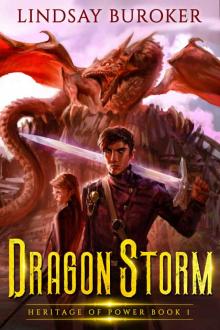 Dragon Storm
Dragon Storm The Goblin Brothers Adventures
The Goblin Brothers Adventures Republic
Republic Cyborg Legacy
Cyborg Legacy Origins
Origins Beginnings: Five Heroic Fantasy Adventure Novels
Beginnings: Five Heroic Fantasy Adventure Novels Warrior Mage
Warrior Mage Swords and Salt - the Complete Series
Swords and Salt - the Complete Series 6.0 - Raptor
6.0 - Raptor Destiny Unchosen
Destiny Unchosen Balanced on the Blade's Edge
Balanced on the Blade's Edge Elven Doom (Death Before Dragons Book 4)
Elven Doom (Death Before Dragons Book 4)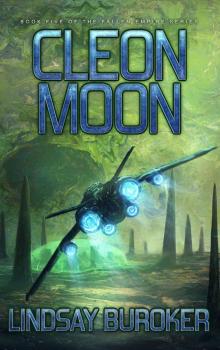 Cleon Moon
Cleon Moon Oaths (Dragon Blood, Book 8)
Oaths (Dragon Blood, Book 8) Crossfire (Star Kingdom Book 4)
Crossfire (Star Kingdom Book 4) Dragon Tear (Agents of the Crown Book 5)
Dragon Tear (Agents of the Crown Book 5) Encrypted
Encrypted Flash Gold
Flash Gold Enigma
Enigma_preview.jpg) Shadows Over Innocence (an Emperor's Edge short story)
Shadows Over Innocence (an Emperor's Edge short story) Decrypted
Decrypted Mist and Magic
Mist and Magic Starseers
Starseers Relic of Sorrows
Relic of Sorrows Blood and Betrayal
Blood and Betrayal Diplomats and Fugitives
Diplomats and Fugitives_preview.jpg) Balanced on the Blade's Edge (Dragon Blood, Book 1)
Balanced on the Blade's Edge (Dragon Blood, Book 1) The Emperor's Edge, no. 1
The Emperor's Edge, no. 1 Gold Dragon
Gold Dragon Duty Bound
Duty Bound Secrets of the Sword 2 (Death Before Dragons Book 8)
Secrets of the Sword 2 (Death Before Dragons Book 8) Peacemaker
Peacemaker Short Stories from the Star Kingdom
Short Stories from the Star Kingdom Shockwave
Shockwave Degrees of Delusion
Degrees of Delusion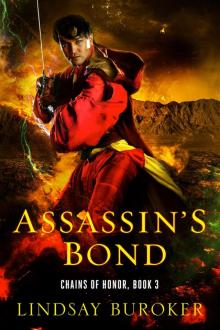 Assassin's Bond (Chains of Honor, Book 3)
Assassin's Bond (Chains of Honor, Book 3)_preview.jpg) The Emperor's Edge (a high fantasy mystery in an era of steam)
The Emperor's Edge (a high fantasy mystery in an era of steam)_preview.jpg) Solstice Day Gifts (an Emperor's Edge Short Story)
Solstice Day Gifts (an Emperor's Edge Short Story) Fractured Stars
Fractured Stars Honor's Flight
Honor's Flight Eye of Truth
Eye of Truth Arkadian Skies
Arkadian Skies Ship of Ruin
Ship of Ruin Unraveled
Unraveled Blood Ties
Blood Ties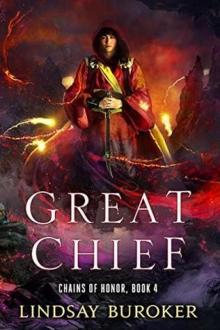 Great Chief
Great Chief End Game
End Game Conspiracy
Conspiracy Gate Quest (Star Kingdom Book 5)
Gate Quest (Star Kingdom Book 5) Claimed
Claimed Under the Ice Blades
Under the Ice Blades Hero Code
Hero Code Battle Bond: An Urban Fantasy Dragon Series (Death Before Dragons Book 2)
Battle Bond: An Urban Fantasy Dragon Series (Death Before Dragons Book 2) Blood Charged
Blood Charged Angle of Truth
Angle of Truth Junkyard
Junkyard Agents of the Crown- The Complete Series
Agents of the Crown- The Complete Series Planet Killer (Star Kingdom Book 6)
Planet Killer (Star Kingdom Book 6) Shadows Over Innocence
Shadows Over Innocence Forged in Blood I ee-6
Forged in Blood I ee-6 Sinister Magic: An Urban Fantasy Dragon Series (Death Before Dragons Book 1)
Sinister Magic: An Urban Fantasy Dragon Series (Death Before Dragons Book 1) Blood and Betrayal (The Emperor's Edge Book 5)
Blood and Betrayal (The Emperor's Edge Book 5) Smuggler Ship
Smuggler Ship The Rogue Prince (Sky Full of Stars, Book 1)
The Rogue Prince (Sky Full of Stars, Book 1) The Emperor's Edge (a high fantasy adventure in an era of steam)
The Emperor's Edge (a high fantasy adventure in an era of steam) Great Chief (Chains of Honor, Book 4)
Great Chief (Chains of Honor, Book 4) Hunted fgc-2
Hunted fgc-2 Shadows Over Innocence (emperor's edge)
Shadows Over Innocence (emperor's edge)![[Fallen Empire 00.5 - 03.0] Star Nomad Honor's Flight Starfall Station Starseers Last Command Read online](http://i1.bookreadfree.com/i/03/22/fallen_empire_00_5_-_03_0_star_nomad_hon_starfall_station_starseers_last_command_preview.jpg) [Fallen Empire 00.5 - 03.0] Star Nomad Honor's Flight Starfall Station Starseers Last Command
[Fallen Empire 00.5 - 03.0] Star Nomad Honor's Flight Starfall Station Starseers Last Command Arkadian Skies: Fallen Empire, Book 6
Arkadian Skies: Fallen Empire, Book 6 Enigma (emperor's edge)
Enigma (emperor's edge) Diplomats and Fugitives (The Emperor's Edge Book 9)
Diplomats and Fugitives (The Emperor's Edge Book 9) The Emperor's edge tee-1
The Emperor's edge tee-1 Liberty (Flash Gold, #5)
Liberty (Flash Gold, #5) Starseers: Fallen Empire, Book 3
Starseers: Fallen Empire, Book 3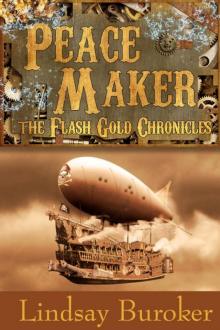 Peacemaker fgc-3
Peacemaker fgc-3 Angle of Truth (Sky Full of Stars, Book 2)
Angle of Truth (Sky Full of Stars, Book 2) Perilous Hunt: Fallen Empire, Book 7
Perilous Hunt: Fallen Empire, Book 7 Ice Cracker II (emperor's edge)
Ice Cracker II (emperor's edge) Conspiracy (The Emperor's Edge Book 4)
Conspiracy (The Emperor's Edge Book 4) Decrypted (Encrypted #2)
Decrypted (Encrypted #2) Forgotten Ages (The Complete Series)
Forgotten Ages (The Complete Series) You Are Here: Tales of Cartographic Wonders
You Are Here: Tales of Cartographic Wonders Duty Bound (Agents of the Crown Book 3)
Duty Bound (Agents of the Crown Book 3) Snake Heart (Chains of Honor Book 2)
Snake Heart (Chains of Honor Book 2) Conspiracy ee-4
Conspiracy ee-4 Flash Gold fgc-1
Flash Gold fgc-1 Fallen Empire 1: Star Nomad
Fallen Empire 1: Star Nomad Claimed (The Flash Gold Chronicles, #4)
Claimed (The Flash Gold Chronicles, #4) Ice Cracker II (and other short stories) (The Emperor's Edge)
Ice Cracker II (and other short stories) (The Emperor's Edge) Fallen Empire 2: Honor's Flight
Fallen Empire 2: Honor's Flight Gold Dragon (Heritage of Power Book 5)
Gold Dragon (Heritage of Power Book 5) Encrypted (the emperor's edge)
Encrypted (the emperor's edge) Peacemaker (The Flash Gold Chronicles, #3)
Peacemaker (The Flash Gold Chronicles, #3) Patterns in the Dark (Dragon Blood Book 4)
Patterns in the Dark (Dragon Blood Book 4) Cyborg Legacy: A Fallen Empire Novel
Cyborg Legacy: A Fallen Empire Novel The Swords & Salt Collection
The Swords & Salt Collection Blood and Betrayal ee-5
Blood and Betrayal ee-5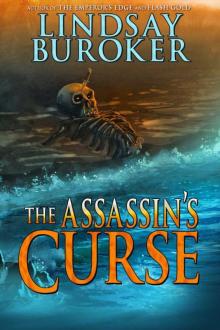 The assassin curse
The assassin curse Warrior Mage (Book 1)
Warrior Mage (Book 1) Forged in Blood II ee-7
Forged in Blood II ee-7 Relic of Sorrows: Fallen Empire, Book 4
Relic of Sorrows: Fallen Empire, Book 4 Deadly Games ee-3
Deadly Games ee-3 Elven Fury (Agents of the Crown Book 4)
Elven Fury (Agents of the Crown Book 4) Torrent rar-1
Torrent rar-1